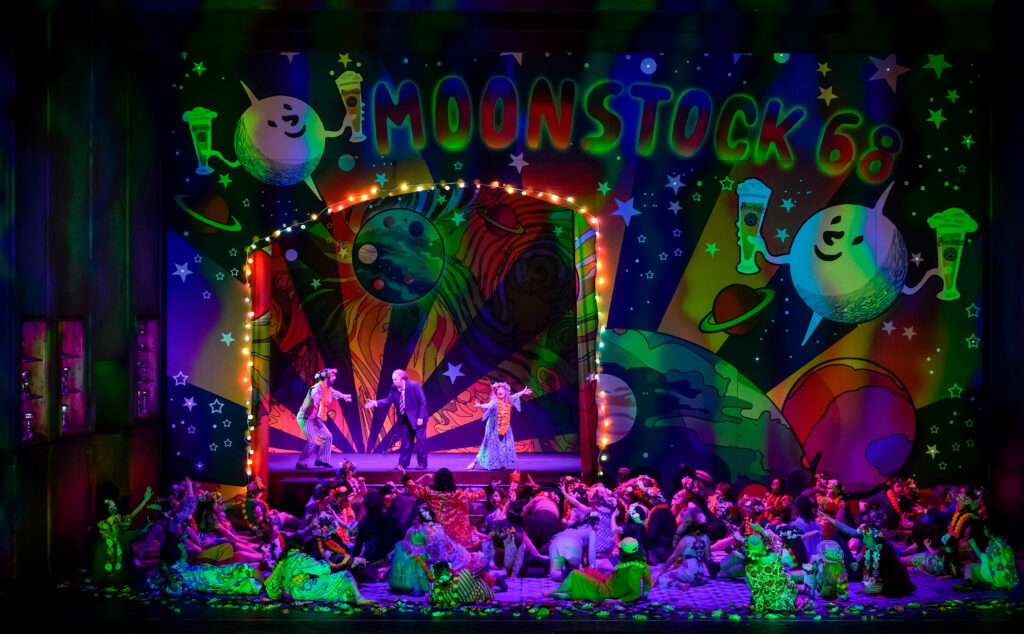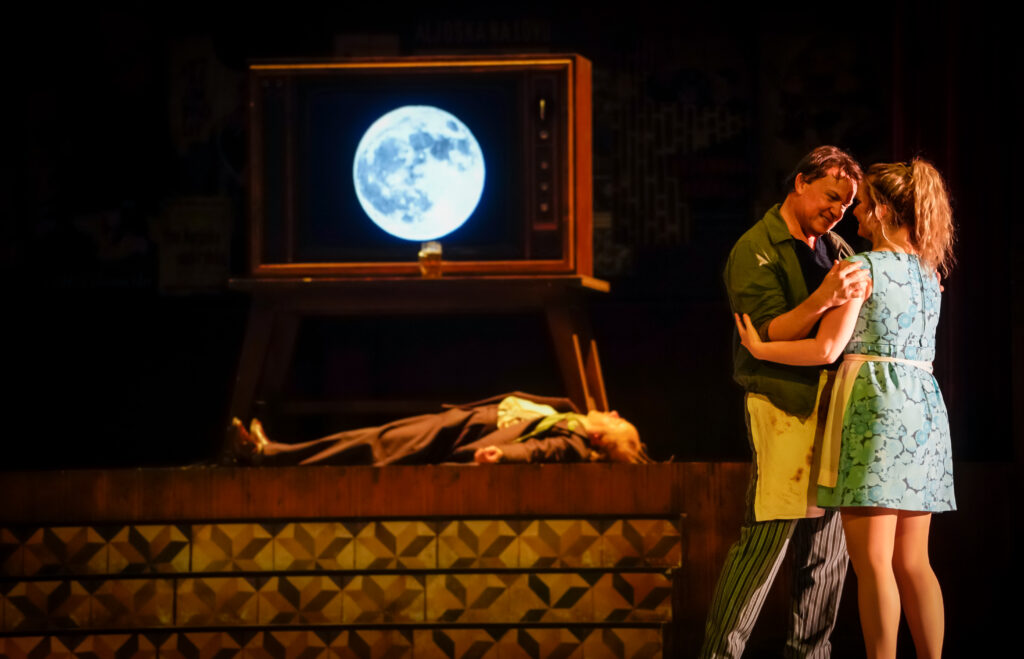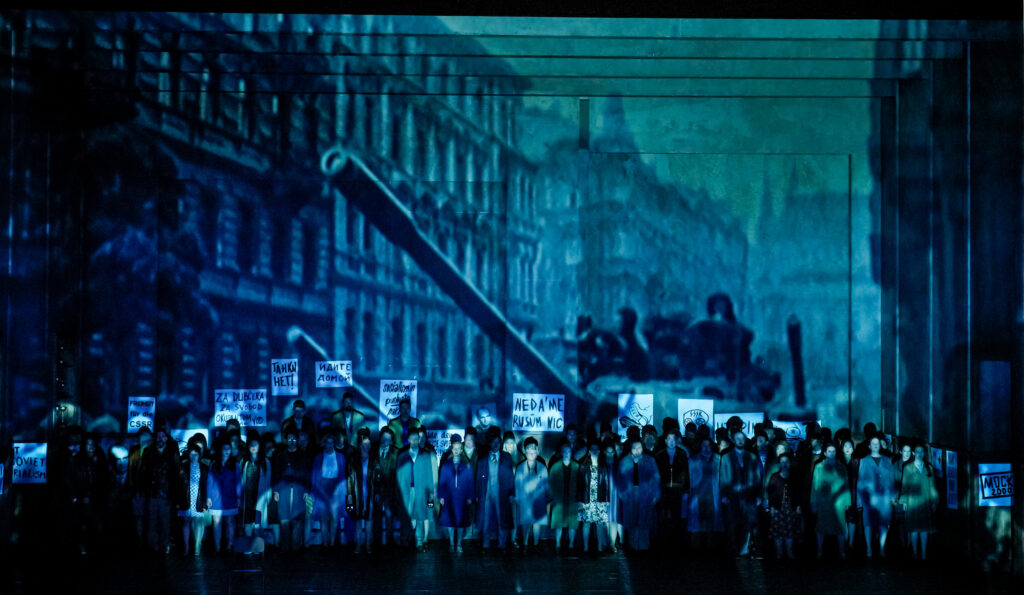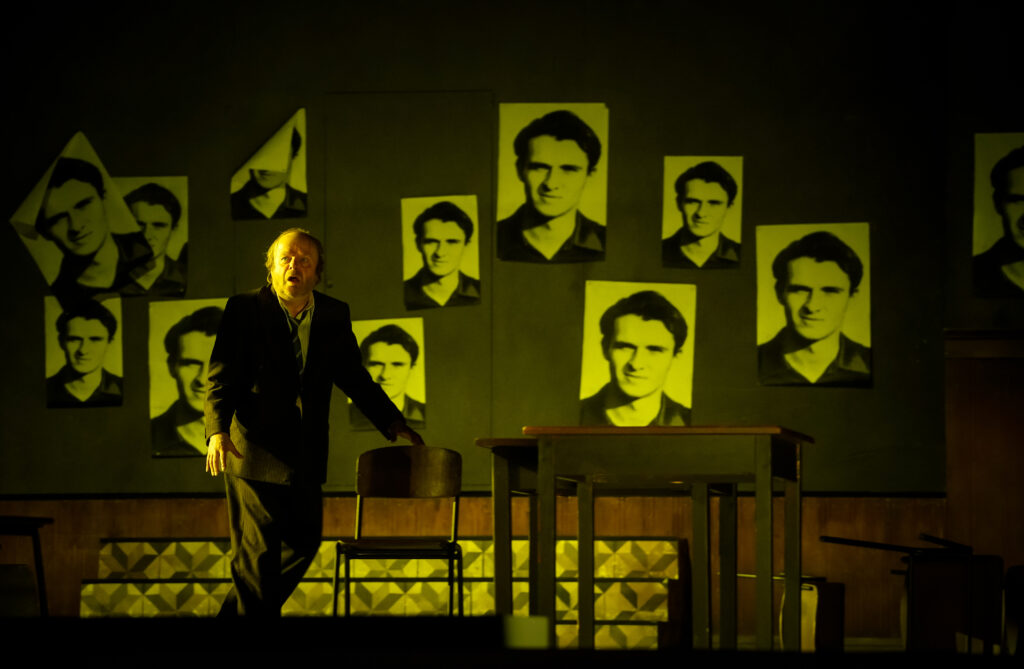Who hasn’t been to Prague at least once? The Golden City impresses millions of tourists every year. If you really want to get to know it, you have to go where the locals meet. These are the pubs. This is where Leoš Janáček’s opera ‘The Excursions of Mr Broucek’ begins, performed on 20 March 2025 at the Berlin State Opera Unter den Linden – the second performance after the premiere on 16 March 2025, which was first performed in 1920. Now the plot has been transferred several years into the future under the direction of Robert Carsen. Mr Brouček (Peter Hoare), a lonely and unhappy landlord who is only interested in drinking and sausages, lingers in his favourite pub in 1969. Peter Hoare staggers across the stage and leaves no doubt that he is playing a man in a drunken stupor. Nevertheless, he sings with full voice and power, a masterly performance.
Mr Brouček dreams himself into other spheres and times. His first journey takes him to the moon. Shortly beforehand, he has seen the images of the first US moon landing on television in his pub. Mr Brouček doesn’t get along with the lunar population any more than he does with the people on Earth. There are hippies living on the moon who celebrate ‘Moonstock’ and are disgusted by Mr Brouček’s meat consumption. The fantastic stage design by Radu Boruzescu is convincing, the moon dwellers are befuddled by the scent of flowers, they are in other spheres, the colours are impressive – it is almost absurd to order roast pork and dumplings now. ‘Maso! Maso!’ (meat)

Peter Horare’s counterpart is the tenor Aleš Briscein, a womaniser who appears in different guises in the journeys through time and space and is always convincing in his singing. He is supported by soprano Lucy Crowe, who also slips into different roles and reaches great heights.

There is a lot of dancing on the moon, ecstatic and wild. In between, historical film footage is shown of the return from the moon and the landing in the water, the crew of Apollo 11, who are celebrated as heroes in the USA. The orchestra, conducted by the master Sir Simon Rattle, shows that Janaček’s opera can also be interpreted as film music.
After the interval, the hitherto cheerful play takes an abrupt turn. Mr Brouček undertakes another journey. This takes him back in time. In the 15th century, there is a war between supporters of the reformer Jan Hus and the troops of the Roman-German King Sigismund. The Hussites call on Mr Brouček to go into battle with them. But he feels no emotion for their cause.
The past and present, in which the play is set, become blurred in these scenes. It is no longer clear whether it is really about the Hussite Wars or rather the Prague Spring of 1968.

The use of bagpipes to provide a hymn-like backdrop to the protests and battles is particularly impressive.
There is talk of Jan Hus, but on the wall are pictures of Jan Palach, who burnt himself to death on Prague’s Wenceslas Square in protest against the invasion of Soviet troops. Film footage from the time shows the protests of the citizens and the funeral procession for Jan Palach.

Mr Brouček is supposed to fight, but he doesn’t have a weapon and he doesn’t want to fight, he is supposed to nurse the wounded instead. Malá Strana has already been taken, the enemy have already crossed the Vltava. Drama in the music – drama on the stage.
At the same time, the contrast between the Christian world and ‘unchristian’ Bohemia is drawn. The Antichrist is the evil. The state opera choir sings impressively (Choir Gerhard Polifka). Kunka sings the Lord’s Prayer – alternating with a chorus of soldiers who call for battle with their own text.
In both conflicts, the external powers are too strong for the resistant Czechs. They lose the Hussite Wars and the experiment of democratic reforms of the Prague Spring in socialist Czechoslovakia fails. The Czechs find distraction in beer and ice hockey.
In their favourite sport, they beat the Soviet Union at the end of the 1960s, as the historical footage on stage shows. The ice hockey players come onto the stage dancing. A big hurrah! Triumphant music fills the atmosphere with pride, happiness and lightness.
A chorus of joy and great jubilation at the victory over the enemies sweeps everyone away.
In the background, Mr Brouček pretends to be one of them. But the hoax is exposed. He is not a hero on the battlefield or on the ice, but a bourgeois who only thinks of his own advantage. As punishment, Mr Brouček is beaten up with ice hockey sticks. He has to be locked in a barrel and labelled a black soul.
Thus ends his second journey. He returns to his favourite pub. But even here, at the end of the 1960s, things are no longer as they used to be. Were his excursions and ‘time travelling’ just nightmares?
At the end, a surprising moment of shock awaits the audience. Above all, it is an entertaining evening with plenty of Czech humour and great melodies, but also a clever parable about a small nation caught between pathos, patriotism and political indifference.
There is a lively exchange in the foyer, inspired conversations can be heard, ‘I absolutely have to go to Prague again’ can be heard.